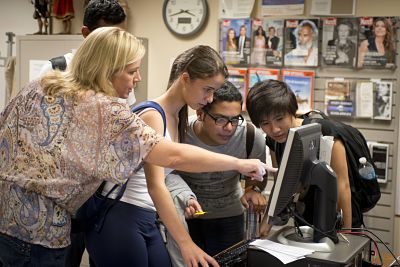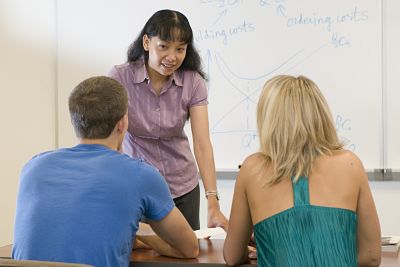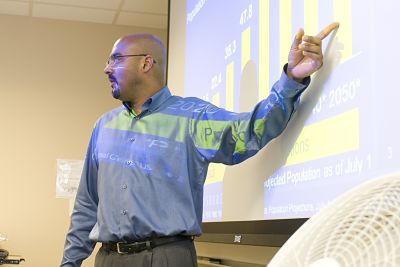
New Faculty Retreat
2025 New Faculty Retreat
Moral Injury in the Academy: Recognition, Resilience, & Repair, Dr. Stephanie Gangemi, Assistant Professor, Social Work, College of Public Service & Dr. Laurel Bidwell, Associate Professor, Social Work, College of Public Service
This session introduces the concept of moral injury and its relevance within the context of higher education. We will explore how systemic pressures, ethical conflicts, and institutional values can impact faculty well-being, while discussing strategies for fostering moral courage, resilience, and collaboration while navigating academic environments.
Dr. Catherine Grandorff, Teaching Professor, Department of English, College of Letters, Arts and Sciences
Teaching at UCCS means stepping into classrooms—both physical and virtual—where the diversity of experiences, identities, and aspirations is as rich as the content we teach. This session offers practical, adaptable strategies to help you connect with your students early, sustain their engagement, and foster a shared sense of the value of learning. You’ll leave with ready-to-use tools, a mid-semester check-in template, and ideas that work whether you’re lecturing in a lecture hall, moderating a discussion board at midnight, or meeting students anywhere in between.
Transparent Pedagogy, Chris Creighton, Ph.D., FRC Instructional Designer
Transparent pedagogy is about being open and engaging with your students about what you are seeking to accomplish in the class. It is moving beyond the task list to why students are doing the learning tasks to begin with. During this session, you will learn how to design transparent activities, assignments, and course policies; and how to work with students to deepen their learning. Engagement expectations: Participants may be asked to engage with whole-group or small-group discussions. Participation is optional.
Engaged and Empowered: Supporting Students While Raising the Bar, Curtis Turner, UCCSTeach, College of Education
In today’s college classrooms, fostering meaningful student engagement requires more than charisma or clever activities—it demands a deliberate balance of challenge and care. This session explores how holding students to high expectations, while providing robust support, can significantly increase effort, deepen learning, and improve outcomes. Grounded in a student-centered approach, we’ll examine strategies for prioritizing essential content, creating space for deep processing through discussion, questioning, and active learning, and cultivating a classroom culture where rigor is paired with relational support. Participants will leave with practical tools and a renewed vision for designing learning experiences that empower students to rise to their potential.
AI in Academics: AI-Integrated Assessments session, Angie Dodson, FRC Faculty Development Coordinator
This workshop guides educators through the process of thoughtfully integrating AI technologies into their assessment practices. Participants will explore how to establish clear, ethically-sound AI policies for their courses using the AI Assessment Scale (AIAS) as a framework. Through collaborative activities and guided discussions, attendees will learn to distinguish between AI-resistant and AI-enhanced assessment approaches, ultimately developing assessment strategies that maintain academic integrity while acknowledging AI's growing role in education. Participants will leave with practical frameworks, customizable templates, and concrete assessment designs they can immediately implement in their teaching contexts.
Previous Faculty Retreats

Crafting Your Teaching Philosophy: Foundations and Practical Tips
Dr. Shannon Johnson, Assistant Professor, Social Work, College of Public Service
A well-articulated teaching philosophy is critical in higher education, for the educator and student alike. A formal teaching philosophy can serve as a guiding framework for the educator, inspiring their instructional practices while advancing their self-awareness and intentionality. For students, the teaching philosophy ultimately communicates the essence of an educator's approach, thus providing transparency and clarity and helping to build trust and engagement. Through a blend of discussion and individual and small-group activities, participants will: a. Explore the core elements of an effective teaching philosophy; b. Begin to draft and/or refine their own teaching philosophy statements. Whether new to teaching or bringing years of experience to the table, participants will leave this session with a greater sense of self-awareness as an educator and with practical strategies for crafting a clear and effective teaching statement.

The Art of Connection: Transformative Teaching Practices for New Faculty
Dr. Laurel Bidwell, Associate Professor, Department of Social Work, College of Public Service
In academia, the initial drive to master content and curricula can sometimes overshadow our primary educational mission—the cultivation of human connections. This workshop, tailored for new faculty, critically examines the traditional "sage on the stage" model, advocating instead for a relational teaching approach that embraces Anti-Racism, Diversity, Equity, and Inclusion (ADEI). We will delve into effective strategies that not only acknowledge but deeply engage with the human dynamics in our classrooms. Participants will learn practical techniques to build meaningful relationships, boost student engagement, and enhance learning outcomes. Through a blend of interactive discussions and activities, this session equips new professors to approach their teaching roles with confidence, joy, and an invigorated focus on the individuals they educate. By its conclusion, attendees will be ready to create a classroom environment where engagement and connection are not just encouraged but are fundamental to achieving educational excellence.

Trauma-informed Teaching and Learning: Defining, Preventing, and Mitigating Harm in the Classroom
Dr. Stephanie Gangemi, Associate Professor, Department of Social Work, College of Public Service
Trauma-informed teaching and learning is an educational approach that is responsive to the prevalence and impact of trauma on students' ability to engage, learn, and succeed in the classroom. This approach integrates a conceptualization of the effects of trauma into all aspects of teaching and learning, to build supportive environments that promote healing and resilience. This presentation briefly explores the definitions of trauma and the effects of traumatic experiences on cognitive, emotional, and interpersonal development. It also examines the signs of trauma in students and discusses how trauma can influence behavior and academic performance and concludes with actionable suggestions for enhancing a trauma-informed approach to teaching and learning. The session will delve into the core principles of trauma-informed teaching and learning which include, safety, trustworthiness, support, collaboration, empowerment, and cultural sensitivity (Carello, 2020). Attendees will learn practical strategies for creating a trauma-informed and trauma-responsive classroom while maximizing opportunities for repair and restoration in educational communities. Through a combination of theory and real-world examples, attendees will gain insights into adapting their teaching methods to support trauma-affected students effectively. By fostering an inclusive and compassionate learning environment, educators can help cultivate resilience, enhance their well-being, and achieve academic success despite the challenges posed by traumatic experiences.
Activating Faculty Wellbeing for Student Achievement
Paige Whitney, Assistant Dean of Interprofessional Education and Director of the Center for Active Living, Health Sciences in the Helen and Arthur E. Johnson Beth-El College of Nursing and Health Sciences
Juggling multiple responsibilities and prioritizing your own health and wellbeing can be a challenge when starting as a new faculty member. Attendees of this 45-minute session learn about the important link between faculty wellbeing and student achievement, while gaining practical tips, tricks, and resources to activate health and wellbeing for all in and outside the classroom. UCCS Trails Single & UCCS Trails.
Developing Significant Learning Experiences & Time Management
Dr. Cerian Gibbes, Associate Professor/Graduate Director, Department of Geography and Environmental Studies, College of Letters, Arts, and Sciences
The material shared, and used as a launching point for the discussion, was a description of high impact practices (HIPs). The session touches on issues of designing effective learning opportunities, issues of belonging, and active pedagogy. Additionally, we will explore time management strategies and explore ways to help participants balance the multiple responsibilities of academic life.
Centering Your Students: Engage with Inclusive Assessment and Grading Practices
Chris Creighton, Ph.D., FRC Instructional Designer
Inclusive teaching practices are essential as it recognizes each student with diverse backgrounds as welcome in our classrooms. Critically, inclusive and student-centered assessment and feedback designs and the corresponding grading systems can lead to better student engagement and more equitable student outcomes. In this session, you will learn to incorporate universal design for learning principles along with equitable grading strategies to enhance your teaching and assessing practices.
Curtis Turner, UCCSTeach, College of Education
In this 60-minute session students learn better when they are actively engaged in the learning process. While lectures and note-taking dominate higher education and can be necessary at times, they are not always the most effective methods. In this session, we will present and share active learning strategies that create a more engaging classroom environment—one that students will look forward to attending. The ultimate benefit will be improved learning outcomes.
ChatGPT and AI in the Academic Classroom, Johanna Creswell Báez, Assistant Professor, Social Work, College of Public Service
This presentation explores the explosion of AI chatbots with a focus on ChatGPT in the academic classroom. ChatGPT is demonstrated and ideas for using this technology with academic integrity is explored.
Empowering Students' Voices: Engaged Writing Through the "Dunlap Method", Dr. Carole Woodall, Associate Professor, History, College of Letters, Arts, and Sciences
This presentation guides participants through a process to empower student writers by focusing on the expression of ideas and use of language. The four-step method gets students engaged as critical readers and responders by boosting confidence.
Designing Writing Assignments so Students Won’t Want to Cheat, Ann N. Amicucci, Ph.D., Director of First-Year Rhetoric and Writing, Associate Professor of English, Department of English, College of Letters, Arts, and Sciences
As Chat GPT makes it easier for students to farm out the thinking, drafting, and research that go into a writing assignment, faculty may want to amp up methods for detecting cheating. Rather than focusing our energy on policing student writing practices, we can better serve students by designing assignments that engage and excite students—and make it less likely students will want to cheat in the first place.
In this presentation, attendees:
- reflect on what makes an assignment engaging and connected to students goals,
- learn why students may choose to use AI for a variety of tasks related to writing,
- learn strategies for designing assignments that make students less likely to plagiarize or use AI, and
- discuss ways to revise current writing assignments.
Goal Setting and Reflection for any Discipline, Baye Herald, Senior IRC Faculty, Technical Communication and Information Design (TCID), College of Letters, Arts, and Sciences
Want to engage students in course content from day one? Want to give students opportunities throughout the semester to reflect on their own progress and understanding of course concepts? This presentation allows you to think about how to apply goal-setting and reflection in your own courses.
Activating Faculty Wellbeing for Student Achievement, Paige Whitney, Assistant Dean of Interprofessional Education and Director of the Center for Active Living, Health Sciences in the Helen and Arthur E. Johnson Beth-El College of Nursing and Health Sciences
Juggling multiple responsibilities and prioritizing your own health and wellbeing can be a challenge when starting as a new faculty member In this presentation learn about the important link between faculty wellbeing and student achievement, while gaining practical tips, tricks, and resources to activate health and wellbeing for all in and outside the classroom.
An Introduction to Faculty Course Questionnaires (FCQS), Grant Clayton, Associate Professor, Teaching and Learning, College of Education
FCQs are the only metric of teaching that is used across all parts of the CU system. Although departments may weigh them differently, IRC and tenure-track faculty must use FCQs as part of their teaching evaluation. This presentation starts with an overview of the instrument and conclude with details about the domains for FCQs, adding additional questions, and ways to use FCQ data for improving teaching.
Instruction that Works from the Student Perspective, Curtis Turner, UCCSTeach, College of Education
In this presentation, high-impact instructional strategies are discussed. The research-based strategies presented are simple to implement and provide exceptional results for your instructional effort. Participants can add anything we talk about to their practice the very next day.
The latter part of the presentation includes a small panel of successful UCCS students who share their experiences regarding instructional strategies that have worked well for them.
Mentoring Circles with the Teaching Fellows
Mentoring circles are designed to provide a space for faculty new to UCCS to talk about first-year experiences, to help with preparation for the first-year review, and to offer a network of support. Email Angie Dodson to receive more information or express interest in being a part of a mentoring circle.
Welcoming Remarks
Jerry Phillips, Director, Excel Science Center
Connecting Students with Faculty and Campus: Strategies for Student Success (Keynote)
Ann N. Amicucci, Ph.D., Director of First-Year Rhetoric and Writing, Associate Professor of English, Department of English, College of Letters, Arts, and Sciences
Students who make connections with faculty, other students, and organizations and events on campus are more likely to be successful in college. This presentation will share strategies faculty can implement in online and in-person classes for building relationships with students and facilitating students’ ability to connect with each other and the campus community.
PowerPoint Presentation | Handout
Student Support and Campus Resources Breakout Sessions
- Supporting First Generation Students
Jesse Perez, Director, Excel Languages Center- This session is designed to give you a foundational framework for supporting first-generation students on the UCCS campus. Your efforts can be the catalyst a first-generation student needs to feel valued and understood which can contribute to student retention and persistence outcomes. At UCCS, we want our first-generation students to take pride in being the “first to go” in their family!
PowerPoint Presentation | Handout
- This session is designed to give you a foundational framework for supporting first-generation students on the UCCS campus. Your efforts can be the catalyst a first-generation student needs to feel valued and understood which can contribute to student retention and persistence outcomes. At UCCS, we want our first-generation students to take pride in being the “first to go” in their family!
- Good Teaching is the Result of Carefully Planned Curriculum, Instruction, and Assessment
Grant Clayton, Associate Professor, College of Education, Teaching and Learning- This presentation introduces planning curricular goals, instructional methods, and assessing student learning to maximize student success. This interactive session will help faculty with the inter-relationship between curriculum, instruction, and assessment.
PowerPoint Presentation | Handout
- This presentation introduces planning curricular goals, instructional methods, and assessing student learning to maximize student success. This interactive session will help faculty with the inter-relationship between curriculum, instruction, and assessment.
Teaching Fellows Breakout Sessions
- Making Headlines and Memes
Tre Wentling, Assistant Professor, Women’s and Ethnic Studies, College of Letters, Arts, and Sciences- Do headlines spark your interest? Have you shared a meme with others or imitated it yourself? Making Headlines and Memes is a creative assignment that promotes active reading, writing practice, and oral communication as well as the promise for engaging in-class discussions.
PowerPoint Presentation | Handout
- Do headlines spark your interest? Have you shared a meme with others or imitated it yourself? Making Headlines and Memes is a creative assignment that promotes active reading, writing practice, and oral communication as well as the promise for engaging in-class discussions.
- Empowering Students’ Voices: Engaged Writing Through the “Dunlap Method”
Carole Woodall, Associate Professor, College of Letters, Arts, and Sciences, History- This interactive session will guide you through a process to empower student writers by focusing on the expression of ideas and use of language. The four-step method gets students engaged as critical readers and responders by boosting confidence.
PowerPoint Presentation | Handout
- This interactive session will guide you through a process to empower student writers by focusing on the expression of ideas and use of language. The four-step method gets students engaged as critical readers and responders by boosting confidence.
Final Hour with the Faculty Resource Center
- Implementing Open Educational Resources (OER) at UCCS
Susan Vandagriff, Scholarly Communications Librarian and Assistant Professor, Instructional and Research Services, Kraemer Family Library
Katherine Cliff, Senior Instructor, Mathematics, College of Letters, Arts, and Sciences
Patrick D’Silva, Instructor, Philosophy, College of Letters Arts and Sciences- Using the OER SUCCESS model, this interactive session will explain what OER are and why they are used, provide resources for locating OER, offer strategies for implementing OER into a course, and touch upon student creation of OER.
PowerPoint Presentation | Handout
- Using the OER SUCCESS model, this interactive session will explain what OER are and why they are used, provide resources for locating OER, offer strategies for implementing OER into a course, and touch upon student creation of OER.
- Promoting Access and Inclusion in Teaching with Universal Design
Angie Dodson, Faculty Development Coordinator, Faculty Resource Center- Using the Faculty Resource Center’s ACCESS Model, this session will provide an overview of universal design and accessibility, describe teaching strategies that support universal design and access, facilitate an open discussion about opportunities for next steps.
PowerPoint Presentation
- Using the Faculty Resource Center’s ACCESS Model, this session will provide an overview of universal design and accessibility, describe teaching strategies that support universal design and access, facilitate an open discussion about opportunities for next steps.
- Connecting with Teaching Resources, Technology Support and Canvas Resources
Jackie Crouch, Instructional Technologist, Faculty Resource Center
Steven Rodela, OIT Academic Support Manager
FRC Resources Handout | OIT Resources Handout